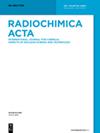利用激光诱导击穿光谱定量测定铀-锆燃料模拟溶解液中的锆含量
IF 1.4
3区 化学
Q4 CHEMISTRY, INORGANIC & NUCLEAR
引用次数: 0
摘要
估算新鲜和辐照金属合金燃料中的锆含量非常重要。与高度异质的固体颗粒相比,均质的溶解液更能代表燃料的成分。本研究利用 LIBS 测定模拟溶解液中的 Zr。利用内部设计的液体样品池,通过 LIBS 分析了 Zr/U 比率从 0.04% 到 0.18% 不等的四种不同成分的 U-Zr 样品。校准图中的测量结果具有良好的相关系数。详细讨论了识别非重叠峰、校准图、精度、偏差和检测限的结果。两组固体样品,即氧化物颗粒和具有相似 Zr/U 成分的金属合金,也通过 LIBS 进行了分析。对这三组样品得到的结果进行了相互比较,并解释了在给定成分的情况下,铝上干燥涂层样品的 Zr/U 强度比更高的原因。本文章由计算机程序翻译,如有差异,请以英文原文为准。
Quantification of Zr in simulated dissolver solution of U–Zr fuel by laser-induced breakdown spectroscopy
Estimation of Zr in fresh and irradiated metal alloy fuel is important. The homogeneous dissolver solution represents the fuel composition better compared to a highly heterogeneous solid pellet. The present study employs LIBS to determine Zr in the simulated dissolver solution. Four different compositions of U–Zr samples where the Zr/U ratio varies from 0.04 to 0.18 % are analyzed by LIBS with an in-house designed liquid sample cell. A good correlation coefficient is achieved for the measurements in the calibration plot. The results for identifying non-overlapping peaks, calibration plot, precision, deviation, and detection limit are discussed in detail. Two set of solid samples, an oxide pellet and metal alloy with similar Zr/U composition, are also analyzed by LIBS. The results obtained from these three set of samples are inter-compared, and the reason for getting a better Zr/U intensity ratio for a dried coating of sample on aluminium for a given composition is explained.
求助全文
通过发布文献求助,成功后即可免费获取论文全文。
去求助
来源期刊

Radiochimica Acta
化学-核科学技术
CiteScore
2.90
自引率
16.70%
发文量
78
审稿时长
6 months
期刊介绍:
Radiochimica Acta publishes manuscripts encompassing chemical aspects of nuclear science and technology.
 求助内容:
求助内容: 应助结果提醒方式:
应助结果提醒方式:


